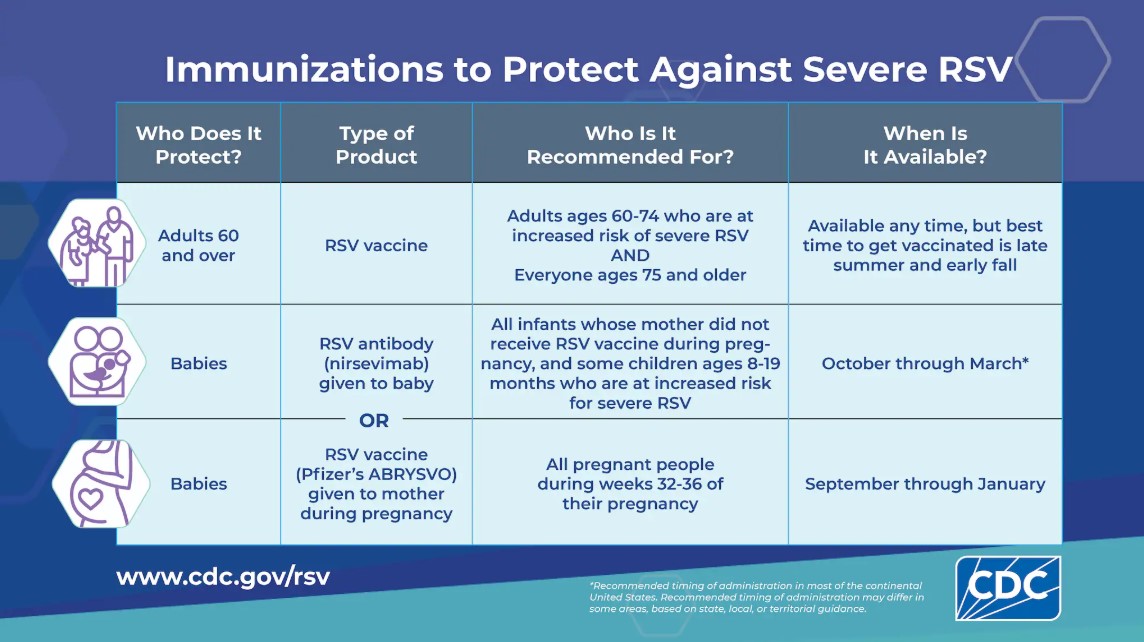Respiratory Syncytial Virus (RSV) Infection
On this page:
About RSV
RSV is a respiratory virus that usually causes mild, cold-like symptoms. Healthy people typically recover in a week or two, but RSV can be serious for infants or older adults. RSV is most common in the fall and winter months.
Symptoms
People with RSV usually show symptoms 4 to 6 days after getting infected. Common RSV symptoms include:

Runny Nose

Coughing

Sneezing

Fever
Other symptoms of RSV may include decrease in appetite or wheezing. In very young infants with RSV, symptoms may only be:
- irritability
- decreased activity
- breathing difficulties
The only way to know if you have RSV is to get a laboratory test. There is no specific treatment for RSV. Talk to a healthcare provider to help manage you or your child's RSV symptoms.
People at Higher Risk
Most people who get RSV have mild illness. Some people may develop severe RSV infection and need care in the hospital. Severe infection may include bronchiolitis (inflammation of airways in the lung) and pneumonia. RSV can also make chronic health problems worse. Infants and older adults are more likely to develop severe RSV and need hospitalization.
- Children at greatest risk for severe illness for RSV include:
- Premature infants
- Infants 6 months and younger
- American Indian and Alaska Native children
- Children with chronic lung disease or heart disease present from birth
- Children with weakened immune systems
- Children with severe cystic fibrosis
- Children who have neuromuscular disorders (includes difficulty swallowing or clearing mucus)
- Adults at highest risk for severe RSV disease include:
- Adults 75 years or older
- Adults with certain other underlying medical conditions
- Adults with chronic heart or lung disease
- Adults with weakened immune systems
- Adults living in nursing homes
Spread
People infected with RSV are usually contagious for 3 to 8 days. They can become contagious a day or two before symptoms begin. RSV can spread from person to person when:
- An infected person coughs or sneezes
- You get droplets from a cough or sneeze in your eyes, nose, or mouth
- You have direct contact with the virus, like kissing the face of a child with RSV
- You touch a surface that has the virus on it, like a doorknob, and then touch your face before washing your hands
Prevention
RSV immunizations are available for these groups:
- Adults age 60 or older
- Pregnant people during weeks 32 through 36 of pregnancy
- Infants and some young children
Adults Age 60 and Over
Older adults are at greater risk than young adults for serious illness from RSV. Certain underlying medical conditions may increase risk as well. Vaccination is recommended for:
- Adults age 75 and older
- Adults ages 60-74 who are at increased risk for severe RSV
If you are 60 years of age or older, talk to a health care provider to see if RSV vaccination is right for you.
Pregnant People During Weeks 32 Through 36
Infants are at risk for getting severe illness from RSV. When someone gets RSV vaccine, their body makes antibodies to fight the virus. This process takes about 2 weeks.
When a pregnant person gets the RSV vaccine, these antibodies pass to the baby. Babies who are born at least 2 weeks after the pregnant person gets the RSV vaccine get protected at birth. Protection will last during your baby's first 6 months, while they are at highest risk of severe RSV.
If you have already received a maternal RSV vaccine during any previous pregnancy, US CDC does not currently recommend you get another dose of RSV vaccine when you are pregnant again. Instead, your baby should receive the RSV immunization.
If you are pregnant, talk to a health care provider about getting RSV vaccine to protect your baby.
Infants and Some Young Children
Talk to a health care provider about getting an RSV antibody immunization for your child if:
- Your child is younger than 8 months old, AND
- born during their first RSV season (fall through spring) or
- entering their first RSV season (fall through spring)
- your child is between the ages of 8 and 19 months old, entering their second RSV season, AND
- They have chronic lung disease from being born prematurely
- They are severely immunocompromised
- They have severe cystic fibrosis
- They are American Indian or Alaskan Native

Everyday Prevention
You can take the following steps to prevent the spread of RSV:
- Cover your coughs and sneezes with a tissue or your arm, not your hands.
- Wash your hands often with soap and water for at least 20 seconds.
- Avoid close contact. This includes kissing, shaking hands, and sharing eating utensils with others.
- Clean frequently touched surfaces such as doorknobs and mobile devices.
People with cold-like symptoms should not interact with children at high risk. If this is not possible, carefully follow the prevention steps mentioned above. Wash hands before interacting with child(ren). Avoid kissing high-risk children while having cold-like symptoms.

